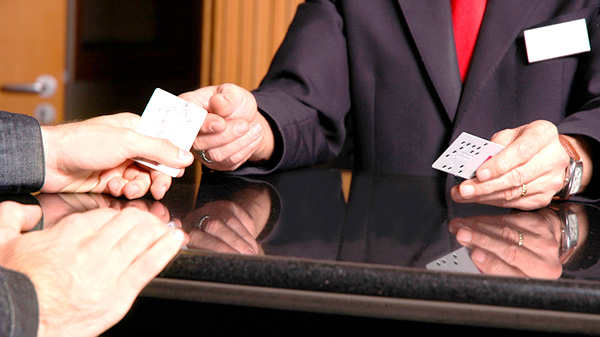
Don’t keep your key card in an envelope that identifies the room or any personal information.
Whether you travel for business or leisure, consider increasing your safety awareness when you stay in a hotel.
BEFORE YOUR TRIP
- While most top properties are in safe areas, you may want to research before booking a room in an unfamiliar city or neighborhood to confirm. Call the community resource officer in the police jurisdiction responsible for the area where the hotel is located, or use free online research sites such as the FBI’s Uniform Crime Reporting tools or CrimeReports.com
- Be careful about sharing your travel plans on social media. Make sure your settings are private; avoid making public posts to protect yourself while you are traveling and your home is unoccupied.
- Choose a hotel that is adequately protected from fire. Check the U.S. Fire Administration’s Hotel-Motel National Master List to find hotels that have:
- At least one single-station and hard-wired smoke alarm in each guest room
- An automatic fire sprinkler system in each guest room if the building has four or more stories. More information about hotel fire safety is available in our blog, Planning a hotel or motel stay? Think about fire safety.
- Pack a flashlight that you can keep on the hotel nightstand in case you need to escape in the dark.
- Take only those valuables that you will absolutely need for the trip.
UPON CHECK-IN
- Limit the number of times you say your name and room number during the check-in process. At any given time, a number of people could be within earshot of the front desk.
- Do not keep your room key in the envelope provided at check-in. Securely discard the envelope, which may contain identifying information, such as room number and last name.
- Keep a close eye on your luggage while in the lobby.
- Upon entering your guest room, verify that all sliding glass doors, windows and connecting room doors are locked and secure.
- Inspect mattresses for bedbugs. Check the U.S. Environmental Protection Agency’s article on How to Find Bed Bugs to learn how to inspect a mattress and accurately identify a bedbug infestation.
DURING YOUR STAY
- When you are in your room, be sure to engage all locking mechanisms on your guest room door, including deadbolts, chain and safety bar.
- Do not open the door to your hotel room to unknown persons. If you are not expecting a hotel staff person, call the front desk to verify his or her identity before opening the door.
- If returning to the hotel late in the evening, use the main entrance.
- Keep valuables locked in the room safe or inside your luggage.
- Exercise discretion when providing your name and room number while in the hotel restaurant or bar.
CYBER SAFETY
- Pay attention to cyber security if you use a computer or mobile device on hotel Wi-Fi systems. Don’t assume that the Wi-Fi connection is secure.
- When available, use a hard-wired connection or a personal Wi-Fi hotspot rather than a public Wi‑Fi connection.
This loss control information is advisory only. The author assumes no responsibility for management or control of loss control activities. Not all exposures are identified in this article.
